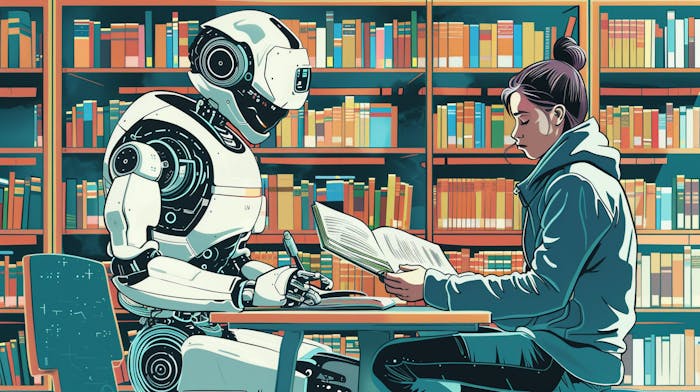“One of the biggest revolutions in reading, ever.” AI tools are changing how we read
books.
Chat with your books, quiz yourself, and dive deeper. AI-powered reading is the next big idea waiting to blow up.

There's increasing demand for books with interactive, dynamic features.
Avid readers like Andrej Karpathy and Patrick Collison see a lot of potential, as current tools for AI-assisted reading are lackluster.
Tyler Cowen calls this “one of the biggest revolutions in reading, ever.”
Imagine this: your books aren’t just for passive reading anymore. You can chat with them, ask questions about the context, get instant summaries, or even instantly instantly whip up quizzes on the material.
And that’s just scratching the surface.
Picture an AI reading tool that doesn’t just process your highlights, but pulls in related content from the book, adds relevant images, and even generates summaries, quizzes, or Anki cards for memorization.
This concept was recently floated on X by Andrej Karpathy, former Director of AI at Tesla and a founding AI researcher at OpenAI:
For now, Karpathy admits, achieving this vision involves a lot of hacking with scripts and workarounds. But the demand for a polished solution is right there.
Patrick Collison, Stripe’s co-founder, also vented his frustrations about the current DIY workflow for integrating AI with books:
Tools like Gemini help a bit, but the whole process is still a hassle without a smoother solution.
Economist Tyler Cowen, writing on Marginal Revolution, also uses AI to get the most of his reading. But he offered a different point of view, that using tools to chat directly with books is overkill and misses a simpler solution:
“You don’t have to upload any book into the system. The Great Cosmic Mind is smarter than most of the books you could jam into the context window. Just start asking questions. The core intuition is simply that you should be asking more questions. And now you have someone/something to ask!
“I was reading a book on Indian history, and the author reference the Morley reforms of 1909. I did not know what those were, and so I posed a question and received a very good answer, read those here. I simply asked 'What were the Morley reforms done by the British in India in 1909?'“Then I asked 'did those apply to all parts of India?'”
He went on to call AI "one of the biggest revolutions in reading, ever."
Regardless of Cowen's opinion on the need for tools, it's clear that demand is there, and indie hackers should start building.
Simplify the process, add value to readers, and you’ll be tapping into a market hungry for a solution.
Have a story, tip, or trend worth covering? Tell us at [email protected].

I'm pretty surprised this isn't a reality yet. Especially with Google Books, my e-reader of choice. That said, I'm pretty sure it's not merely a tech question, but also a legal and ethical question because major e-reader platforms have to negotiate permissions/license terms with publishers.
Some publishers have taken issue with dead simple tech like text-to-speech functionality because they view it as equivalent to an audiobook, which they earn revenue on separately. Well, if TTS is a bridge publishers are hesitant to cross I can only imagine they'll throw up all kinds of red tape in front of dynamic AI functionality.
Тот кто хочет, может загрузить электронную версию книги в чат GPT4 и с ним ее обсудить. Он хорошо понимает книги в электронке. Для этого не нужно разрешений от ...автора или издания)
Hey everyone,
I've built a tool to turn any book into a website with explanations using AI(for my personal use at start) -
for the first book I picked "Ethics" by Aristotle - which is a practical guide on how to live a life worth living and how to obtain happiness
I also added a translation automation so it is now support different languages
I picked this book since even when translated it really hard to read since the ancient Greek - but it is has super valuable content and it is super relevant to our current times!
Take a look here:
aristotle-ethics dot com( can't paste links yet 😁)
Stack -
NodeJS
Nuxt
Vue
NuxtUI
NuxtHub
The tool automatically split the book(or a collection of books) into chapters, paragraphs, and topics so it is to read with the original text and the explanation
TODOs:
-Still need to add homepage (now you just redirect to the first page of the book)
-What should be the next book? or books?
AI tools are revolutionizing the way we read books, offering new ways to interact with text and enhance the reading experience. From personalized recommendations to smart annotations and even voice-driven storytelling, these advancements are transforming how we engage with literature. As AI continues to evolve, the future of reading promises to be more immersive and accessible than ever before.
AI tools are indeed transforming how we engage with books! With features like text-to-speech, personalized reading recommendations, and even AI-driven summaries, reading has become more accessible and interactive than ever before. These tools are not just for convenience but also for enhancing the overall reading experience, making it easier to absorb information. It’s exciting to see where this technology takes us in the future!
AI tools are truly transforming the way we engage with books! With features like AI-assisted reading, personalized recommendations, and even text-to-speech, these innovations are making reading more accessible and interactive than ever before. It's fascinating to see how these tools are opening up new ways for people to explore literature and gain insights. Just like how WhatsApp group links bring people together for shared interests, AI is creating a whole new community around reading and knowledge sharing